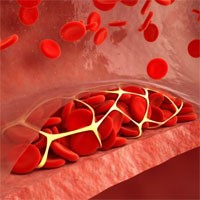Tag: prognosis

COVID-19: Clinical manifestations of blood cell parameters and inflammatory factors
CRP and Lymphocyte count (LYM#) showed strong correlation with disease progression, suggesting that these parameters could be used to monitor changes in patient condition. 92 patients with confirmed COVID-19 at Jingzhou... read more

Management of late onset urea cycle disorders-a remaining challenge for the intensivist?
Awareness of urea cycle disorders in adults intensive care units can optimize early management and accordingly dramatically improve prognosis. By preventing hyperammonemia to induce brain edema and herniation leading to death. Hyperammonemia... read more

Serum Levels of Receptor-interacting Protein Kinase-3 in Patients with COVID-19
Patients with coronavirus disease 2019 (COVID-19) can develop acute respiratory distress syndrome (ARDS), which has been linked to poor prognosis and is a major contributor to patient death. A better understanding of the... read more

Biomarkers of Sepsis: Time for a Reappraisal
The precise roles of most biomarkers in the management of septic patients have not been well defined, and of the many biomarkers that have been studied, only a few have been evaluated in large or repeated studies. As... read more

Prevention, Detection and Management of VTE in COVID-19 Patients
Several studies have demonstrated coagulation changes in patients with COVID-19, especially in those with severe disease, and this is associated with a worse prognosis. Emerging data, alongside recent clinical experience,... read more

Soluble Urokinase Receptor and AKI
The authors concluded that high suPAR levels were associated with Acute Kidney Injury (AKI) in various clinical and experimental contexts. This cohort study reports that suPAR was associated with subsequent AKI in several... read more

Prognostication with Point-of-Care Echocardiography During Cardiac Arrest (ALS)
This topic was prioritized by the ALS Task Force based on the high prevalence of point-of-care echocardiography during cardiac arrest without recognizing the potential pitfalls for misinterpretation as an adjunct prognostic... read more

Influence of Dyskalemia at ICU Admission and Early Dyskalemia Correction on Survival
Dyskalemia is common at ICU admission and associated with increased mortality. Occurrence of cardiac events increased with dyskalemia depth. A correction of serum potassium level by day 2 was associated with improved... read more

Thyroid Storm in the ICU
Thyroid storm requiring ICU admission causes high in-ICU mortality. Multiple organ failure and early cardiogenic shock seem to markedly impact the prognosis, suggesting a prompt identification and an aggressive management. 92... read more

Intensivists’ Preferences for Patient Admission to ICU
ICU consultants vary in the importance they give to different factors in deciding who to prioritize for ICU admission. Transparency regarding which factors have been considered in the decision-making process could reduce... read more

Early Prognostication of Neurological Outcome by HRV in Adults with Out-of-Hospital Sudden Cardiac Arrest
The present data indicate that heart rate variability (HRV) analysis could be useful for early prognostication for comatose patients during hypothermic TTM within 24 h after ROSC. The value of HRV as a prognosticator... read more

Causes and Consequences of Optimistic Expectations About Prognosis by Surrogate Decision-Makers in ICUs
This multicenter study shows that optimistic expectations about prognosis are prevalent among surrogates of patients with advanced critical illness, arise both from misunderstandings by surrogates and from surrogates holding... read more

Nurse intuition may play a role in critical-care outcomes
Nurse intuition doesn't sound scientific, but it could play a key role in critical-care outcomes, according to a small study published in DovePress. The researchers conducted a descriptive phenomenological study, interviewing... read more

The Ability of ICU Physicians to Estimate Long-Term Prognosis in Survivors of Critical Illness
Prognoses estimated by physicians incorrectly predicted long-term survival and HRQoL in one-third of ICU survivors. Moreover, inaccurate prognoses were generally the result of overoptimistic expectations of outcome. Among... read more








